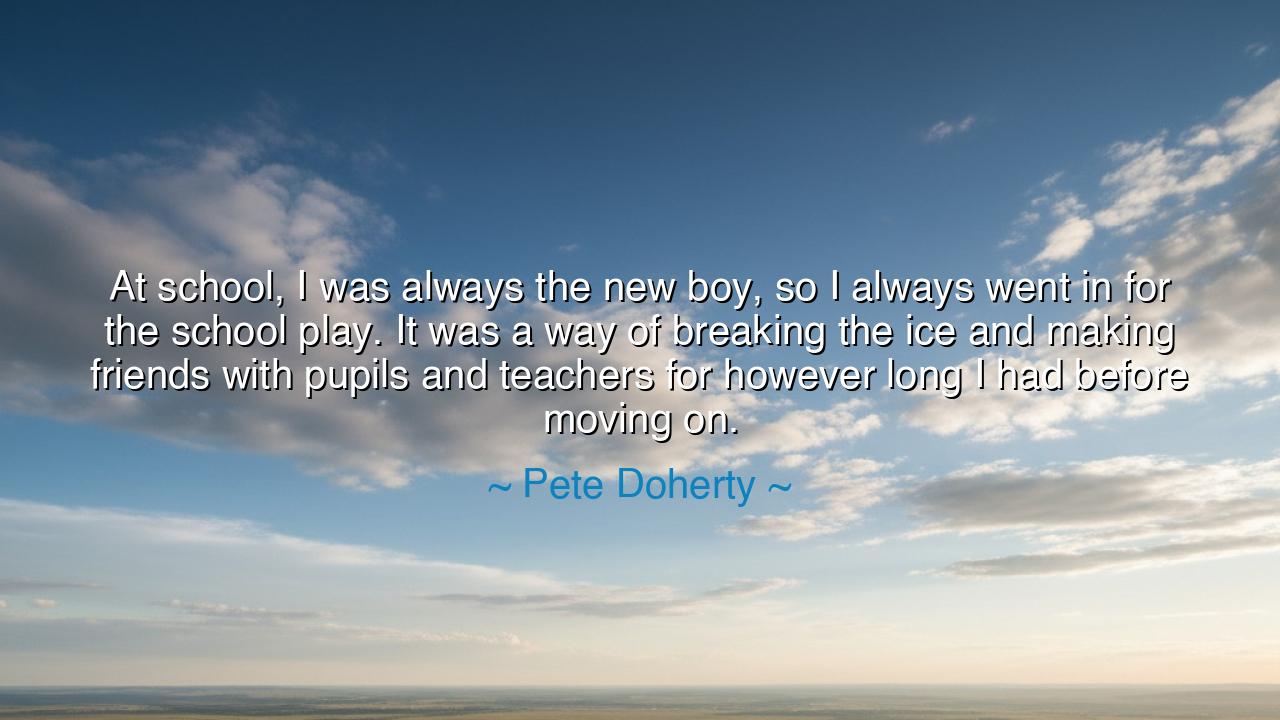
At school, I was always the new boy, so I always went in for the
At school, I was always the new boy, so I always went in for the school play. It was a way of breaking the ice and making friends with pupils and teachers for however long I had before moving on.






The poet and musician Pete Doherty, reflecting on the restless journey of his youth, once confessed: “At school, I was always the new boy, so I always went in for the school play. It was a way of breaking the ice and making friends with pupils and teachers for however long I had before moving on.” These words, though simple in appearance, speak to the ancient struggle of belonging, of finding one’s place amidst constant change, and of the creative power of art to bridge the distance between strangers.
To be the new boy is to dwell in the realm of the outsider. Each arrival at a new school is a battlefield of silence, where every face is unknown and every bond has been woven long before your coming. In such a place, loneliness stalks like a shadow. Yet Doherty chose not despair, but courage: he stepped into the realm of the school play, a stage where he could reveal his soul, win laughter, admiration, and friendship, and break the barriers of isolation. Thus, art became his sword and shield, his means of entering the circle of belonging.
The school play was more than performance — it was an act of survival. By joining the drama, Doherty claimed a role not just upon the stage, but within the community itself. He showed that art has the power to unite, to forge connection where words alone may falter. This truth is as old as the first storytellers who gathered tribes around the fire, weaving tales to bind them together. When we create, when we perform, when we share in laughter and song, we dissolve the walls that separate “me” from “you” and become, for a time, one people.
History offers us a shining example in William Shakespeare, who too was once a stranger to the great city of London. Unknown, uncelebrated, he stepped upon the stage of the world with his plays, and through them, he made himself known to rich and poor alike. His words became the bridge between classes, hearts, and generations. Like Doherty, he found in performance the power to overcome isolation, to transform the outsider into the voice of a community.
Yet Doherty also reminds us of the fleeting nature of such connections. He speaks of friendship with teachers and pupils “for however long I had before moving on.” Here lies another truth: that life is filled with impermanence. We enter places, we weave bonds, and then time and fate call us onward. What matters is not how long we remain, but the courage to open ourselves while we are there. Even temporary friendships, even brief acts of belonging, enrich the soul and make the journey lighter.
The lesson, then, is twofold: first, that art and expression are sacred tools of connection; second, that one must not fear impermanence, but embrace it. We will all be the “new boy” or the “new girl” at times in our lives — stepping into jobs, communities, or lands where we are strangers. In such moments, let us follow Doherty’s example: step into the play, the song, the conversation. Dare to reveal yourself, for it is through vulnerability that friendship is born.
Practical wisdom follows: when you find yourself a stranger in a new place, do not wait for others to reach out — take the first step. Offer your talents, your humor, your story. Seek the common stage where all can gather, whether in art, work, or shared purpose. And do not grieve the brevity of such moments. Instead, cherish them, for each connection made along the way is a spark that lights the greater fire of your journey.
So remember, O listener, the words of Pete Doherty: “I always went in for the school play… it was a way of breaking the ice before moving on.” Let them remind you that art has the power to turn strangers into friends, and that life itself is a series of stages where we play our part before the curtain falls and we move on. Play your role with courage and openness, and though the stage may change, your soul will grow richer with every act.






AAdministratorAdministrator
Welcome, honored guests. Please leave a comment, we will respond soon